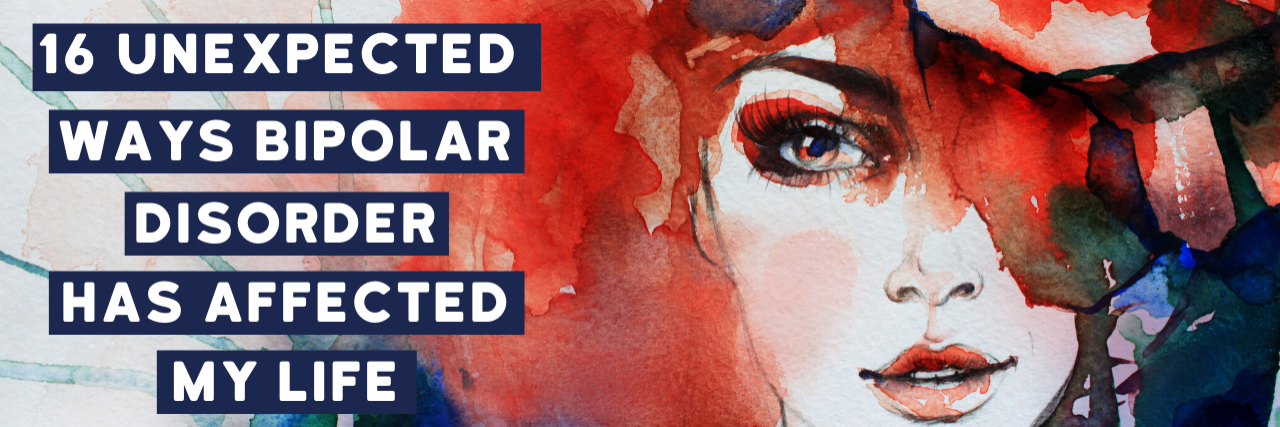16 Unexpected Ways Bipolar Has Affected My Life
When first diagnosed with bipolar disorder, your doctor probably went over the condition and the most common symptoms you might experience. However, over time, you’ve probably noticed that living with bipolar can be more than just experiencing the “typical” symptoms.
Mental illness can affect your life in many ways. For example, you might feel isolated from friends and family because they don’t understand what you’re going through. Or maybe you’re hesitant to find resources because of the stigma often associated with the illness.
However, you might also find that living with a mental illness has positively affected your life. You may feel more empathetic and understand better what others are going through when they are struggling. You might now know your limits and be better at adapting to change than before. Perhaps you actually feel less isolated now with a mental illness diagnosis because you’ve been able to find community and support through it.
The Mighty wanted to know more about the unexpected ways having bipolar has affected those living with the condition. That’s why we reached out to the bipolar community on The Mighty to hear about their experience.
Here’s what they had to say:
- “I have learned a lot about myself, my limits, my strengths, weakness and overall tuning into my own self.” — Helen F.
- “In a way, it’s made me more aware of myself and my needs and taught me how to prioritize self-care even when I’m having a low mood.” — Erin A.
- “[It’s] made me more aware of changes in my behavior and [I] notice patterns within myself.” — Charlotte M.
- “Showering can be hard for me at times. Not at all what I pictured when I was diagnosed!” — Becca L.
- “I found out a lot about the people around me and how much they actually care. I also have learned the value of an apology.” — Anastasia H.
- “Positively, I’m incredibly empathetic towards/for others and it’s taught me a lot about myself, as well as society and how to ‘fit’ in. [But] negatively, there are the intrusive thoughts you have to learn how to be strong enough to fight. Also, overthinking *everything* and going for the worst-case scenario. Those times when it’s really hard to describe how you’re feeling, and/or what you need.” — Krystal L.
- “I can never tell if I’m just having a good day, or if it’s the start of a manic episode. It means I’m always on edge and can never feel genuinely happy.” — Elena W.
- “[I do not know] if a new interest is genuine. It seems like everything new must be questioned, analyzed and discussed with my partner because I honestly can’t tell if it’s a flight of an idea or an actual thing.” — Lauren M.
- “I feel much more [able to] adapt [to] aging than a lot of my peers because I’ve had so much experience in having to modify my thinking and lifestyle already. For them, it’s new and scary and they are trying to deny it’s happening, while I’ve already made peace with that part.” — @ofunsolicitedadvice
- “It taught me to slow down. I am still touched that my family still loves me even when I’m not overachieving.” — @lapsed_bookworm
- “I am unable to work because I’m unreliable. My husband is constantly struggling to deal with my ever-changing moods, never knowing what to expect. I’m lucky to have a support group that is willing to look past my flaws and help me work towards my goals in life without letting my diagnosis tear me down.” — Alyssa M.
- “[It’s hard] to be in a relationship after you are honest and tell them you are bipolar. They need to know, but you are looked at as an unstable partner.” — Britten M.
- “It most definitely opened my eyes to the stigma of mental illness. It brought me to my knees in humility. I was not invincible. Receiving the diagnosis itself brought clarity to some of my confusing memories, which ended up actually being symptoms.” — Sara J.
- “Bipolar disorder gives you the ability to optimistically challenge yourself to achieve great things followed by the guts and tenaciousness to see it through.” — Jody W.
- “I hate when I feel like I’m better than everybody. Like I have that ‘god-like’ feeling.” — @dmvari
- “[I] went to college to get a degree and ended up with two. [It] provided a lot of answers about why I acted the way I did while growing up. Also, [it’s given me] the opportunity of seeing myself and mental illness in a different way. Even though it is still hard to function during the ups and downs it has helped me see how valuable I am through doing things that can help me continue fighting during those times.” — @hsmith35
Editor’s note: Some responses have been shortened and edited for clarity.
If you’d like to learn more about bipolar disorder and find resources, visit the International Bipolar Foundation.
Banner image via Anna Ismagilova/ Getty Images

